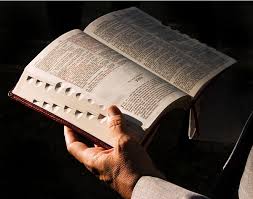 1 SAMUEL
1 SAMUEL
The judicial priesthood connection is here broken. Both judge and priest go in Eli. The ark is taken – a total breach. Power is lost. Then God comes in, in His own sovereign way, by a prophet, as He had earlier when He brought them out of Egypt. (Everything on the ground of man’s responsibility was gone; but God’s sending a prophet was sovereign mercy.) Before He brings in strength (the king), He brings in prophecy – note this. Before Christ returns in power, it is the testimony of the Spirit and word, by which a connection is maintained between God and His people. From Eli to David on the throne the principle is faith and power, not succession.
But flesh requires governmental order,* and it gets what it wants. However, it breaks down under the power of the enemy. Even believers who cling to the flesh, fall with it (Jonathan). If governmental order is established without Christ, they cannot accept Christ’s coming to set it aside. The one in whom hope is (David) must be content to be as a partridge on the mountains.
Saul was raised up to put down the Philistines and Jonathan subdued them. Saul did not, and was destroyed by them. Jonathan was a believer associated with the outward order. The place of faith was with David. It is the place of the power of faith without the king.
{*It is quite true that there was a want through the misrule of Samuel’s sons. Spiritual energy had failed. The church can only stand in power: when it turned to the principle of succession, all was lost.}
2 SAMUEL
Saul falls on the mountains of Gilboa. Then we get the royalty of David, in active power, not in the reign of peace. There was the promise that God would maintain David’s house, however they conducted themselves. God would chasten them if disobedient, but not take His mercy from them. Then we get David’s personal failure when he is king.
There is another element – the ark and the temple come in question. The relationship with God is re-established first by faith, not according to order, but by spiritual power according to grace. The ark was on Mount Zion, and there they were singing, “His mercy endureth for ever”. At Gibeon there was the high place, and Solomon went there. The tabernacle was there, but not the ark. Solomon is not seen at Mount Zion till his return from Gibeon, after God answered him. Consequent on God’s interfering in deliverance and redemption, the place of ordered worship is set up, connected with earth, at the threshing-floor of Araunah the Jebusite. It was after judgment: people had been slain, and sacrifice made. God loves Jerusalem; He stays His hand in judgment, and shows by prophecy the path of reconciliation by sacrifice.
1 AND 2 KINGS.
Here we have the reign of Solomon, the figure of the great Son of David. We have the establishment of Israel in peace, and the building of the temple. This fails in Rehoboam. The book of Kings then gives us the history of Israel, not Judah, but with sufficient notices of Judah to carry on the history. You get the intervention of God in mercy, by prophets in Elijah and Elisha. In the midst of Israel, Elijah was a testimony to Israel, who had left the temple, on the ground of responsibility; Elisha was a testimony in resurrection-power.
First and Second Kings continue the history in Judah till the captivity, and then Lo-ammi (not my people) was written on the nation. There are, of course, many details and various characters. Hezekiah had faith, Josiah showed obedience, Jehoshaphat had piety, but through association with the world, there never was success.
1 AND 2 CHRONICLES
Chronicles gives us the history of the family of David – ending with the Babylonish captivity.
1 Chronicles is David himself. At the close, David has the pattern of everything by the Spirit, and leaves it to Solomon to execute.
2 Chronicles is David’s posterity.
Chronicles is more connected with the establishment of the kingdom on earth; Kings is more figurative of what is heavenly. In the temple in Chronicles there is a veil (2 Chron. 3:14), in Kings there is not. The veil will not be rent for Israel in the millennium.
Lightly edited by Sosthenes, May 2014

One thought on “A Brief Outline of the Books of the Bible – Samuel, Kings, Chronicles”